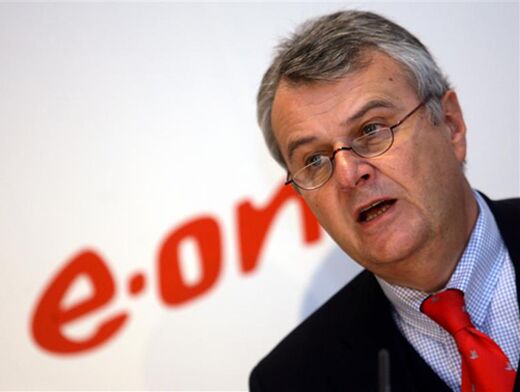
Germany’s Corporate Blitzkrieg
After years of stagnation, Germany is reclaiming its role as the economic powerhouse of Europe. Consequently, mainland Europe’s economy is growing at its fastest rate in six years—surpassing Britain and the United States according to recent figures.
Germany’s “economic knot of the last few years has finally been broken,” declared Economy Minister Michael Glos. “The upturn has gained in strength and breadth. … [T]he prospects for this year are exceptionally positive” (Guardian,August 15). Germany, which has the largest economy in Europe, accounts for 20 percent of all economic activity in the European Union. Germany is also the world’s largest exporter and has its third-largest economy (New York Times, January 17).
According to the Guardian, a primary driver of Germany’s economic growth is now consumer spending. Consumer confidence is sprouting, and the German economy is finally emerging from the economic gloom of the past decade which was characterized by consumers saving rather than spending. A reinvigorated Germany has “far-reaching implications” for Europe and even the whole world, says the New York Times (op. cit.). Those implications include a possible drop in international reliance on American consumers, resulting in a dollar devaluation; and German-based corporations becoming far stronger and more aggressive—a trend that is already gathering steam.
German companies are perfectly positioned to take advantage of the new German consumer spending. Years of weak economic growth gave many German corporations the bargaining power needed to cut staff, demand employees work longer hours, and increase productivity—all while forcing them to innovate and become more efficient in order to remain competitive. All across Germany, domestic-owned corporate giants such as Siemens, Volkswagen and DaimlerChrysler were able to bring their unions under control, often by threatening to move jobs overseas. The effect is a stronger, more competitive corporate sector.
Meanwhile, as Germany’s corporate giants restructured, they also focused on increasing their exports to foreign nations, largely within Europe. In fact, over the past 10 years, German enterprises have increased their eurozone market share by more than 25 percent—more than double that of their French rivals and more than 2½ times that of the Italians (German Foreign Policy, August 9). Foreign sales have also allowed German corporations to become highly profitable. Both 2004 and 2005 were record revenue-generating years for German companies, and according to current predictions, this year will see a new record again. Last year, more than 130 industrial, commercial and service companies listed on Germany’s four leading stock exchanges increased their net profits by an average of 30 percent.
This German corporate strength is beginning to be recognized. Recent stats show German business confidence is close to a 15-year high and German corporations are hiring again. The result: a more confident German industry, which, “[b]ack in fighting trim … has begun flexing its muscles overseas” (New York Times, op. cit.).
The most visible manifestation of German corporate muscle-flexing has been the recent deluge of German corporate takeovers—many of them hostile.
“Germany companies have stepped on the gas in the past 12 months,” said Tim Albrecht, a fund manager at dws Investment in Frankfurt. “They’re in conquering mode, and we’ve not hit the peak yet” (International Herald Tribune,March 16).
As of March this year, German companies had already agreed to spend a record $99.5 billion on takeovers—more than in all of 2005 (ibid.). Swiss bank ubs says nearly 65 percent of this year’s bids by German corporations were either hostile or at least unsolicited (German Foreign Policy, op. cit.). Business Week calls the corporate leaders of German hunter companies like Siemens, the engineering group Linde, and energy conglomerate E.On, “young lions” that are “quick to pounce.”
To date, the $58.8 billion hostile bid by German gas and power utility E.On for Spain’s Endesa is the year’s largest. If this deal goes through, E.On, which is already Europe’s dominant combined electricity and gas provider, will become Spain’s largest power supplier and probably Germany’s largest publicly owned company. Endesa also has holdings in Portugal, Italy, North Africa, Brazil and Chile.
In 2001, E.On purchased British-owned Powergen for $9.5 billion, making it Britain’s second-largest electricity and gas provider. Following that was a quick succession of takeovers of Eastern European firms. In 2003, E.On purchased Ruhrgas, which gave it a 6.5 percent stake in Russia’s super-giant gas company Gazprom, making it the largest foreign shareholder in the group. An E.On adviser says the reason the German company is so successful at takeovers is because its huge pile of cash allows it “to blow rivals out of the water” (Financial Times, February 22).
Thomas Koerfgen of seb Investment in Frankfurt said the recent spate of German corporate takeovers is simply a result of the fact that “[c]ompanies have become healthier and are looking for means of growth. It’s the logical next step to make acquisitions” (ibid.).
German influence is increasingly being felt across the Continent. Major power, gas, water, manufacturing, telecommunications, finance and media corporations are increasingly falling to German buyers. These are industries which no nation would want to have in the hands of an enemy when the going gets tough. Even in good times, it opens a nation up to coercion—in bad times, blackmail or worse.
German financiers and businessmen—“merchants” of the earth (Revelation 18:23)—are turning their nation into the economic hub for the world. Twice in the past century, such merchants marched in step with the military—with devastating results.
A third world war is coming, and this time much of Europe will, willingly or unwillingly, come to rely on Germany or find itself under Germany’s economic control. This time, Germany will not have to fight for Europe, because it will already control it.
Be forewarned. Trouble out of Europe is coming, and Germany will be the driving force behind it. Germany’s recent corporate blitzkrieg is just the precursor to a much larger event. For more information on the inevitable future implications of a German-dominated and unified Europe read the booklet Germany and the Holy Roman Empire.
